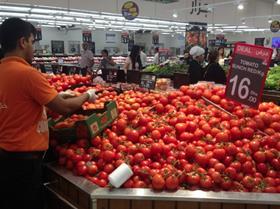
Locally grown fruit and vegetables are increasing in demand in the UAE, despite the higher growing costs involved, according to a report in The National.
Some retailers have launched particular initiatives to support local production, including Spinneys with its UAE Farmers’ Club, launched in 2015 to support local growers, improve product freshness and develop more sustainable growing practices.
According to the retailer, the club is reserved for those farmers that meet Spinneys’ guidelines for quality and sustainability.
Organic producers require accreditation from at least one awarding body to qualify for the club, as well as the UAE’s Emirates Authority for Standardisation and Metrology.
Spinneys’ club currently boasts eight growers, including Al Rawafed Agriculture Organic Farm, one of the UAE’s largest organic producers, Elite Agro, Dar Al Fateh and Integrated Green Resources UAE.
The retailer works with the growers to run regular promotions, increasing their frequency during the Ramadan period as part of a campaign to encourage consumers shoppers to buy local.
Matt Frost, chief executive of Spinneys, commented: “We are committed where it is practical and possible to source products from the UAE. Promoting local brands is something that we have been doing on an ongoing basis, as much as we possibly can. This is very much part and parcel of our commitment.”
Last year, the UAE government launched a scheme to widen the availability of organics in the country’s supermarkets. It started to supply farming equipment to growers, including tools for organic and hydroponic farming at half price, helping some producers to offer prices equal to or lower than imports of items like tomatoes, cucumbers and aubergines.
Other initiatives to encourage local consumption include the I’mperfect campaign, which promotes aesthetically imperfect fruit and vegetables that would previously have been rejected by supermarkets over concerns that shoppers would refuse to buy them.
The number of farms in the UAE increased from 4,000 in 1971 to 35,704 in 2011, according to official government statistics, including 54 organic farms.



